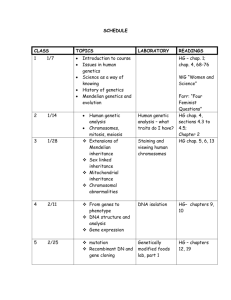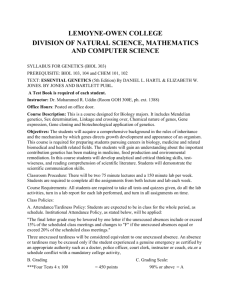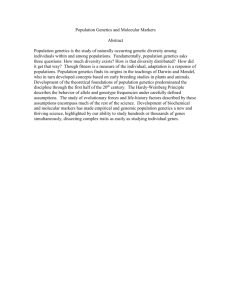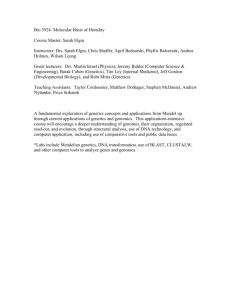Goulielmos Giorgos
advertisement
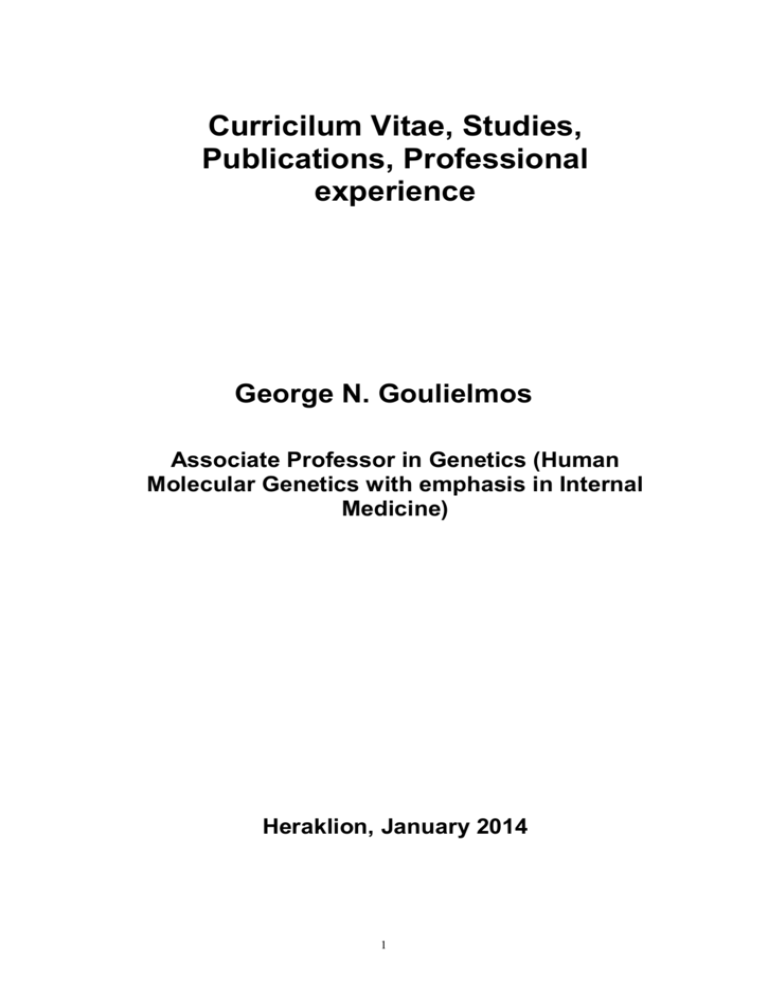
Curricilum Vitae, Studies, Publications, Professional experience George N. Goulielmos Associate Professor in Genetics (Human Molecular Genetics with emphasis in Internal Medicine) Heraklion, January 2014 1 I. Curriculum Vitae Date of Birth : February 2, 1963 Place of Birth : Chania – Crete, Greece Marital Status : Married Academic Summary Education Bachelor of Science, Degree in Biology (September 1980-March 1985), University of Patras, Patras, Greece. Doctor of Philosophy, Degree in Biology (April 1985-December 1989), University of Patras, Patras, Greece. Positions held January 1987-December 1989: Participation in a project supported by the Greek General Secretariat of Research and Technology, dealing with the experimental approach of the speciation theory. July 1989-March 1990: Researcher in the Institute of Marine Biology of Crete. April 1990-May 1993: Postdoctoral Researcher in the Institute of Molecular Biology and Biotechnology (IMBB) of Crete. June 1993-April 1997: Postdoctoral Researcher in the European Molecular Biology Laboratory (EMBL), Heidelberg, Germany. September 1994-March 1997: Visitor Scientist in BIOZENTRUM, University of Basel, Basel, Switzerland. May 1997-August 1999: Associate Researcher in the Department of Biology, University of Crete. Associate Researcher in the Department of Neurology and Sensory Organs, School of Medicine, University of Crete. September 1999-November 2004: Lecturer of Genetics, Department of Agricultural Biotechnology, Agricultural University of Athens. December 1999-December 2004: Visiting Researcher in the Laboratory of Population and Evolutionary Genetics, Department of Biology, University of Crete. December 2004-April 2006: Lecturer in Human Molecular Genetics, School of Medicine, University of Crete. 2 September 2007-October 2013: Assistant Professor in Human Molecular Genetics, School of Medicine, University of Crete. Head of the Molecular Medicine and Human Genetics Section October 2013-present: Associate Professor in Human Molecular Genetics, School of Medicine, University of Crete. II . Ad Ηoc reviewer in scientific journals 1. 2. 3. 4. 5. 6. 7. 8. 9. 10. 11. 12. 13. 14. 15. 16. 17. 18. 19. 20. 21. 22. 23. 24. 25. 26. 27. 28. 29. 30. 31. 32. 33. 34. 35. 36. 37. 38. 39. 40. 41. 42. 43. 44. Archives of Medical Research Arthritis and Rheumatism Arthritis Research and Therapy Annals of Human Genetics Annals of the Rheumatic Diseases African Journal of Biotechnology BioMed Research International BMC Medical Genetics Clinical Biochemistry Clinical and Developmental Immunology Clinical Experimental Immunology Clinical Genetics Current Genomics Diabetes Research and Clinical Practice Disease Markers European Journal of Human Genetics European Journal of Entomology European Journal of Pediatrics Genes and Immunity Genetica Global Research Journal of Microbiology Human Immunology Human Molecular Genetics Immunology Interdisciplinary Perspectives on Infectious Diseases International Journal of Clinical Rheumatology International Journal of Immunogenetics International Journal of Rheumatic Diseases ISRN Genetics Joint Bone Spine Journal of Blood Disorders & Transfusion Journal of Investigative Medicine Journal of Medical Genetics and Genomics International Journal of Medical Sciences and Biotechnology Journal of Pharmacy and Pharmacological Research Lupus Lung Molecular Biology Reports Molecular Medicine Nature Reviews in Rheumatology Nitric Oxid: Biology and Chemistry Pediatrics International Pediatric Diabetes PLoS ONE 3 45. 46. 47. 48. 49. Prudence Journal of Medicine and Medical Sciences Rheumatology Scandinavian Journal of Rheumatology The Journal of Rheumatology The Pharmacogenomics Journal III. Reviewer in scientific funding organizations 1. Dutch Arthritis Association – Reumafonds, the Netherlands 2. Wellcome Trust, UK IV. Member of the editorial board in scientific journals 1. 2. 3. 4. Dataset Papers in Medicine Clinical and Developmental Immunology International Journal of Medicine and Biomedical Research African Journal of Biotechnology V. Publications in peer-reviewed journals * Corresponding author 1. Goulielmos, G.N., Kilias, G. and S.N. Alahiotis (1986). Adaptation of Drosophila enzymes to temperature. V. Heat shock effect on the malate dehydrogenase of Drosophila melanogaster. Comp. Biochem. and Physiol. 85 B(1): 229-234. 2. Alahiotis, S.N., Goulielmos, G.N., and G. Kilias (1987). Reactions of Drosophila enzymes to temperature. Potential adaptive regimes. In Isozymes: Current Topics in Biological and Medical Research (Eds. C. Market, J. Scandalios and G. Whitt, New York, NY), vol 15: 153-178. 3. Karvountzi, E., Goulielmos, G.N., Kalpaxis, D. and S.N. Alahiotis (1989). Adaptation of Drosophila enzymes to temperature. VI. Acclimation studies using the malate dehydrogenase (MDH) and lactate dehydrogenase (LDH) systems. J. Thermal Biol. 14(1): 55-61. 4. Goulielmos, G.N., and S.N. Alahiotis (1989). Induction of the malate dehydrogenase and acetylcholinesterase by ecdysone and heat shock in Drosophila ovaries. Insect Biochem. 19(4): 393-399. 5. Goulielmos, G.N., and S.N. Alahiotis (1989). Interspecific hybridization between D. melanogaster sibling species. Isozymic patterns (in interspecific hybrids) and reproductive relationships. Genome 30: 146-154. 6. Killias, G., G.N. Goulielmos, and S.N. Alahiotis (1989). Interspecific hybridization between D. melanogaster sibling species. Fitness components. Hereditas 110: 267-274. 7. Tzimagiorgis, G., Leversha, M., Chroniary, K., Goulielmos, G.N., Sargent, C., Ferguson-Smith, M., and N.K. Moschonas (1993). Structure and expression analysis of a novel member of the human glutamate dehydrogenase (GLUD) gene family mapped to chromosome 10p 11.2. Hum. Genet. 91: 433-438. 4 8. Goulielmos, G.N., Angelicheva, D., Kapsetaki, M., Manifava, M., and Moschonas N. (1993). A chromosome 10p 11.2 GT-dinucleotide polymorphism at the GLUDP5 locus. Hum. Mol. Genet. 2 (8): 1328. 9. Moschonas, N, Goulielmos, G.N., Lubyova, B., Manifava, M., and Kapsetaki M. (1993). A chromosome 10q 23 GT-dinucleotide polymorphism associated with the GLUD1 locus. Hum. Mol. Genet. 2 (11): 1981. 10. Goulielmos, G.N., Manifava, M., and Moschonas N.K. (1993). Dinucleotide-repeat polymorphism at the GLUDP2. Hum. Mol. Genet. 2 (12): 2202. 11. Goulielmos, G.N. and Zouros (1995). Incompatibility analysis of male hybrid sterility in two Drosophila species: Lack of evidence for maternal, cytoplasmic or transposable element effects. Am. Nat. 145: 1006-1014. 12. Goulielmos, G.N., Gounari, F., Remington, S., Muller, S., Haner, M., Aebi, U., and Georgatos, S.D. (1996). Filensin and phakinin form beaded intermediate filaments and co-assemble de novo in non-lenticular cells. J. Cell Biol. 132 (4): 643-655. 13. Goulielmos, G.N., Remington, S., Schwesinger, F., Georgatos, S.D. and Gounari F. (1996). Contribution of the structural domains of filensin in polymer formation and filament distribution. J. Cell Sci 109: 447-456. 14. Tavosanis, G., Llamazares, S., Goulielmos, G.N. and C. Gonzalez (1997). Essential role for γ-tubulin in the acentriolar female meiotic spindle of Drosophila. EMBO J. 16(8): 1809-1819. Georgatos, S.D., Gounari, F., Goulielmos, G.N., and U. Aebi (1997). To bead or not to bead? Lensspecific intermediate filaments revisited. J. Cell Sci. 110 (21): 2629-2634. *Goulielmos, G.N., Cosmidis, N., Loukas, M., Tsakas, S. and E. Zouros (2001). Characterization of two Alcohol Dehydrogenase (Adh) loci from the olive fruit fly, Bactrocera (Dacus) oleae and implications for Adh duplication in dipteran insects. J. Mol. Evol. 52 (1): 29-39. Bondinas, G.P., Loukas, M.G., Goulielmos, G.N. and D. Sperlich (2001). The actin loci in the genus Drosophila: Establishment of chromosomal homologies among five palaearctic Drosophila obscura species by in situ hybridization. Chromosoma 110:441-450. 15. Bondinas, G.P., Loukas, M.G., Goulielmos, G.N. and D. Sperlich (2002). The actin loci in the genus Drosophila: Establishment of chromosomal homologies among five neoarctic Drosophila obscura species by in situ hybridization. Chromosoma 111:256-266. 16. Cosmidis, N., Pepa, V., Loukas, M., Goulielmos, G.N. and E. Zouros (2002). Effect of acetone feeding on Alcohol Dehydrogenase (ADH) activity in Bactrocera oleae. Heredity 89:453-459. 17. Arhontaki, K., Eliopoulos, E, *Goulielmos, G.N, Kastanis, P., Tsakas, S., Loukas, M. and F. Ayala (2002). Functional constraints of CuZn superoxide dismutase in species of Drosophila melanogaster subgroup and phylogenetic analysis. J. Mol. Evol. 55:745-756. 18. *Goulielmos, G.N., Cosmidis, N., Theodorakopoulou, M.E., Loukas, M. and E. Zouros (2003). Tracing the history of an enzyme polymorphism: the case of alcohol dehydrogenase-2 (Adh-2) of the olive fruit fly Bactrocera oleae. Mol Biol Evol 20:293-306. 5 19. *Goulielmos, G.N., Loukas, M., Bondinas, G. and Zouros, E. (2003). Exploring the evolutionary history of the alcohol dehydrogenase gene (Adh) duplication in species of the family Tephritidae. J. Mol. Evol. 57:170-180. 20. Kastanis, P., Eliopoulos, E., *Goulielmos, G., Tsakas, S. and Loukas, M. (2003). Macroevolutionary relationships of species of Drosophila melanogaster group based on mtDNA sequences. Molecular Phylogenetics Evolution 28:518-528. 21. *Goulielmos, G.N., Eliopoulos, E., Arhontaki, K., Tserpistali, K., Tsakas, S. and Loukas, M. (2003). Drosophila Cu, Zn superoxide dismutase gene confers resistance to paraquat in Escherichia coli. Biochem. Biophys. Res. Commun. 308:433-438. 22. *Goulielmos, G.N., Eliopoulos, E., Loukas, M. and Tsakas, S. (2004). Functional constraints of 6-phosphogluconate dehydrogenase (6PGD) protein based on sequence and structural information. J. Mol. Evol. 59:358371. 23. Eliopoulos, E., *Goulielmos, G.N. and Loukas, M. (2004). Functional constraints of alcohol dehydrogenase (ADH) of Tephritidae and relationships with other dipteran species. J. Mol. Evol. 58:493-505. 24. Mantziou, G, Antoniou, A, Poulakakis, N, Goulielmos, G, Tsigenopoulos, C, Pinou, T, and Mylonas, M. (2005). Isolation and characterization of six polymorphic microsatellite markers in the fresh water turtle Mauremys rivulata (Testudines: Geoemydidae). Mol. Ecol. Notes 5:727-729. 25. Poulakakis, N., Goulielmos, G., Antoniou, A., Zouros, E., and Mylonas, M. (2005). Isolation and characterization of polymorphic microsatellite markers in the wall lizard Podarcis erhardii (Squamata: Lacertidae). Mol. Ecol. Notes 5:549-551. 26. *Goulielmos, G.N., Cosmidis, N., Eliopoulos, E., Loukas, M., and Zouros, E. (2006). Cloning and structural characterization of the 6phosphogluconate dehydrogenase (6Pgd) locus of the medfly Ceratitis capitata and the olive fruit fly Bactrocera oleae. Biochem. Biophys. Res. Commun. 341:721-727. 27. Bourikas, L., Kritikos, H., Sidiropoulos, P., Goulielmos, G. and Boumpas, D. (2006). Concomitant onset of Grave’s disease and Rheumatoid arthritis following a serious life event. A case report and review of the literature. J. Clin. Rheumatology 12:326-327. 28. *Goulielmos, G.N., Fragouli, E., Aksentijevich, I., P. Sidiropoulos, Boumpas, D.T., and Eliopoulos, E (2006). Mutational analysis of the PRYSPRY domain of pyrin and implications for familial Mediterranean Fever (FMF). Biochem. Biophys. Res. Commun. 345:1326-1332. 29. Vazgiourakis, V., Sidiropoulos, P., Bertsias, G., Raptopoulou, A., Koutsounaki, E., Fragouli, E., Kritikos, H., Boumpas, D.T. and *Goulielmos, G.N. (2007). Association of the nitric oxide synthase gene (eNOS) polymorphism with increased risk for rheumatoid arthritis - but not for systemic lupus erythematosus - in population of Crete, a southerneastern European Greek island. Lupus 16:867-874. 30. Sidiropoulos, P.I., Goulielmos, G.N., Voloudakis, G., Petraki, E. and D.T. Boumpas (2007). Inflammasome and rheumatic diseases: evolving concepts. Ann Rheum Dis 67:1382-1389. 31. Fragouli E., E. Eliopoulos, E. Petraki, P. Sidiropoulos, I. Aksentijevich, E. Galanakis, H. Kritikos, A. Repa, G. Fragiadakis, D.T. Boumpas, and *G.N. 6 Goulielmos (2008). Familial Mediterranean Fever (FMF): a genetic, biochemical and structural approach of the disease in cretan population, a population of “intermediate risk”. Clin Genetics 73:152-159. 32. Galanakis, E., Kofteridis, D., Stratigi, K., Petraki, K., Vazgiourakis, V., Fragouli, E., Mamoulakis, D., Boumpas, D.T. and *G.N. Goulielmos (2008). Intron 4 polymorphism of the endothelial NO synthase gene is associated with both T1 and T2 diabetes in a genetically homogeneous population. Hum Immunol 69:279-283. 33. Ilia S, Goulielmos G.N., Samonis G, Galanakis E. (2008). Host’s response in acute otitis media: evidence of genetic susceptibility. Pediatr Infect Dis J. 27: 929-933. 34. Koutsounaki, E., Goulielmos, G.N., Koulentaki, M., Choulaki, C., Kouroumalis, E., and Galanakis, E. (2008). Mannose-Binding Lectin Polymorphisms and Outcome of Patients with Chronic Hepatitis C. J. Clin. Immun. 28:495-500. 35. Zervou, M.I., Sidiropoulos, P., Petraki, E., Vazgiourakis, V., Krasoudaki, E., Raptopoulou, A., Kritikos, H., Choustoulaki, E., Boumpas D.T. and *G.N. Goulielmos (2008). Association of a TRAF1 and a STAT4 gene polymorphism with increased risk for rheumatoid arthritis in a genetically homogeneous population. Hum Immunol 69:576-571. 36. Zervou, M.I., D. Mamoulakis, C. Panierakis, D. T. Boumpas and *G.N. Goulielmos (2008). STAT4: a risk factor for Type 1 Diabetes? Hum Immunol 69:647-650. 37. Cosmidis, N., G. Goulielmos, E. Eliopoulos and M. Loukas (2008). Selection at 6-PGD locus in laboratory populations of Bactrocera oleae. Genet Res 90(5):379-384. 38. Kofteridis, D, E. Krasoudaki, M. Kavousanaki, M.I. Zervou, C. Panierakis, D.T. Boumpas, *G. N. Goulielmos (2009). STAT4 is not associated with T2 diabetes in the genetic homogeneous population of Crete. Genetic Testing and Molecular Biomarkers 13:281-284. 39. Bertsias GK, Nakou M, Choulaki C, Raptopoulou A, Papadimitraki E, Goulielmos G, Kritikos H, Sidiropoulos P, Tzardi M, Kardassis D, Mamalaki C, Boumpas DT. (2009). Genetic, immunologic, and immunohistochemical analysis of the programmed death 1/programmed death ligand 1 pathway in human systemic lupus erythematosus. Arthritis Rheum 60:207-218. 40. C. Panierakis, G.N. Goulielmos, D. Mamoulakis, S. Maraki, E. Papavassileiou, D. T. Boumpas and E. Galanakis (2009). Staphylococcus aureus nasal carriage might be associated with vitamin D receptor polymorphisms in type 1 diabetes. Int J Inf Diseases, 13(6):e437-43. 41. D. Mamoulakis, M. Bitsori, E. Galanakis, V. Vazgiourakis C. Panierakis, *Goulielmos, G.N. (2009). Intron 4 polymorphism of the endothelial nitric oxide synthase gene (eNOS) is not associated with early diabetic microangiopathy in type 1 diabetes. Int. J Immunogenet, 36(3):153-157. 42. F.A.S. Kurreeman, G.N. Goulielmos, B. Z. Alizadeh, B. Rueda, M. Bevova, T. R. Radstake, E. Galanakis, N. Ortego, W. Verduyn, M.I. Zervou, B. Roep, E. Urcelay, D.T. Boumpas, B. P.C. Koeleman, T. W.J.Huizinga, R. E.M. Toes, J. Martin; AADEA Group; SLEGEN Consortium (2010). The TRAF1/C5 region is associated with multiple autoimmune diseases. Ann Rheum Dis 69:696-699. 7 43. Zervou, M.I., G.N. Goulielmos, F. Castro-Giner, A.D. Tosca, S. KruegerKrasagakis (2009). STAT4 gene polymorphism is associated with psoriasis in the genetically homogeneous population of Crete, Greece. Hum Immunol, 70(9):738-741. 44. Eliopoulos DG, Mavroudi I, Pontikoglou C, Ximeri M, Stavroulaki E, Pyrovolaki K, Velegraki M, Spanoudakis M, Goulielmos G, Papadaki HA. (2009). The -509C/T polymorphism of transforming growth factor-β1 is associated with increased risk for development of chronic idiopathic neutropenia. Eur J Haematology, 83(6):535-540. 45. C. Panierakis, G.N. Goulielmos, D. Mamoulakis, E. Petraki, E. Papavasiliou, and E. Galanakis (2009). Vitamin D receptor gene polymorphisms and susceptibility to type 1 diabetes in Crete, Greece. Clin Immunol, 1332:276-281. 46. Plant D., Flynn E., Eyre S., Mbarek H., Dieudé P., Cornelis F., Rantapää Dahlqvist S., Goulielmos G.N., Boumpas D.T., Sidiropoulos P., Johansen J.S., Skjødt H., Lund Hetland M., Klareskog L., Raza K., Witte T., Worthington J. (2010). Investigation of potential non-HLA rheumatoid arthritis susceptibility loci in a European cohort increases the evidence for 10 markers. Ann Rheum Dis, 69:1548-1553. 47. Nakou M, Bertsias G, Stagakis I, Centola M, Tassiulas I, Hatziapostolou M, Kritikos I, Goulielmos G.N., Boumpas DT, Iliopoulos D (2010). Gene Network Analysis of Bone Marrow Mononuclear Cells Reveals Activation of Multiple Kinase Pathways in Human Systemic Lupus Erythematosus. PLoS ONE, 5:e13351. 48. *Goulielmos G.N., Petraki E., Vassou D., Eliopoulos E., Iliopoulos D., Sidiropoulos P., Aksentijevich I., Kardassis, D., Boumpas, D.T. (2010). The role of the pro-apoptotic protein Siva in the pathogenesis of Familial Mediterranean fever: A structural and functional analysis. Biochem. Biophys. Res. Commun.402:141-146. 49. Eliopoulos, E., M.I. Zervou, A. Andreou, K. Dimopoulou, G. Voloudakis, N. Cosmidis, H. Mysirlaki, V. Vazgiourakis, P. Sidiropoulos, T. Newold, D.T. Boumpas and *G.N. Goulielmos (2011). Association of the PTPN22 R620W polymorphism with increased risk for SLE in the genetic homogeneous population of Crete. Lupus 10(5):501-506. 50. Karathanasis N., Steiakaki E., Goulielmos G.N. and Kalmanti M. (2011). The role of the MTHFR 677 and 1298 polymorphisms in Cretan children with acute lymphoblastic leukemia. Genetic Testing Molecular Biomarkers, 15(1-2):5-10. 51. Zervou M.I., Goulielmos G.N., Castro-Giner F., Boumpas D.T., Tosca A.D. and Krueger-Krasagakis S. (2011). A CD40 and a NCOA5 gene polymorphism confer susceptibility to psoriasis in a Greek population. Hum Immunol 72:761-765. 52. Vazgiourakis V., Zervou M.I., Choulaki C., Yilmaz N., Bertsias G., Sidiropoulos P., Plant D., Trouw L.A., Toes R.E., Melissourgaki M., Kardassis D., Yavuz S., Boumpas D.T, *Goulielmos G.N. (2011). A common SNP in the CD40 region is associated with Systemic Lupus Erythematosus and correlates with enhanced CD40 expression. Ann Rheum Dis 70:2184-2190. 53. Zervou M.I., V. Vazgiourakis, N. Yilmaz, E. Kontaki, L.A. Trouw, M. Bicakcigi, RE Toes, D.T. Boumpas, S. Yavuz and *G.N. Goulielmos 8 (2011). TRAF1/C5, eNOS, C1q, but not STAT4 and PTPN22 gene polymorphisms are associated with genetic susceptibility to systemic lupus erythematosus in Turkey. Hum Immunol 72:1210-1213. 54. Vazgiourakis V., M.I. Zervou, E. Eliopoulos, S. Sharma, P. Sidiropoulos, B.S. Franek, E. Myrthianou, M. Melissourgaki, T. Niewold, D.T. Boumpas and *G.N. Goulielmos (2012). Implication of VEGFR2 in Systemic Lupus Erythematosus: A structural biological and genetic approach. Clin Exp Rheumatol 31(1):97-102. 55. Mantaka A., G.N. Goulielmos, M. Koulentaki, O. Tsagournis, A. Voumvouraki, E. Kouroumalis (2012). Polymorphisms of genes related to endothelial cells are associated with Primary Biliary Cirrhosis (PBC) patients of Cretan origin. Hum. Immunol, 73(8):829-835. 56. Mastrodemou S., Vazgiourakis V., Velegraki M., Pavlaki K., Goulielmos G.N., and H.A. Papadaki (2012). Clonal patterns of X-chromosome inactivation in peripheral blood cells of female patients with Chronic Idiopathic Neutropenia Haematologica 97(12):1931-1933. 57. Pesmatzoglou, M., M. Lourou, G.N. Goulielmos, and E. Stiakaki (2012). DNA methyltransferase 3B (DNMT3B) gene promoter and interleukin-1 receptor antagonist (IL-1Ra) polymorphisms in childhood immune thrombocytopenia. Clin. Dev. Immunol., in press. 58. Niewold TB, Goulielmos GN, Tikly M, Assassi S. (2012). Autoimmune disease genetics. Clin Dev Immunol. 2012:262858. doi: 10.1155/2012/262858. Epub 2012 Dec 24. 59. Tzagkaraki E, Sofocleous C, Helen FK, Dinopoulos A, Goulielmos G, Mavrou A, Sofia KT, Kanavakis E. (2013). Screening of UBE3A gene in patients referred for Angelman Syndrome. Eur J Paediatr Neurol. Feb 14. doi:pii: S1090-3798(13)00003-2. 10.1016/j.ejpn.2012.12.010. 60. L.A. Trouw, N. Daha, F.A.S. Kurreeman, S. Böhringer, G.N. Goulielmos, H.J. Westra, A. Zhernakova, L. Franke, E.A. Stahl, E.W.N. Levarht, G. Stoeken-Rijsbergen, W. Verduijn, A. Roos, Y. Li, J.J. HouwingDuistermaat, T.W. Huizinga and R.E. Toes (2013). Genetic variants of C1q are a risk for Rheumatoid Arthritis. Clin. Exp. Immunol., Accepted manuscript online: 5 MAR 2013 06:21AM EST | DOI: 10.1111/cei.12097. 61. G.N. Goulielmos, G. Samonis, M. Apergi, M. Christofaki, A. Valachis, M.I. Zervou, D.P. Kofteridis (2013). C1q but not Mannose-binding lectin (Mbl-2) gene polymorphisms are associated with Type 2 diabetes in the genetically homogeneous population of the island of Crete in Greece. Hum. Immunol., in press (http://dx.doi.org/10.1016/j.humimm.2013.04.003). 62. J. Cobb, D. Plant, E. Flynn, H. Mbarek, P. Dieudé, F. Cornelis, L. Ärlestig, S. Rantapää Dahlqvist, G.N. Goulielmos, D.T. Boumpas, P. Sidiropoulos, J.S. Johansen, L.M. Ørnbjerg, M. Lund Hetland, L. Klareskog, A. Filer, C.D. Buckley, K. Raza, T. Witte, R.E. Schmidt, O. FitzGerald, D. Veale, S. Eyre, Worthington. (2013). Identification of the tyrosine-protein phosphatase non-receptor type 2 (PTPN2) as a rheumatoid arthritis susceptibility locus in Europeans. PLoS ONE, in press (DOI:10.1371/journal.pone.0066456). 63. D.G. Dimopoulou, M.I. Zervou, M. Trachana, E. Myrthianou, J. PratsidouGertsi, D. Kardasis, A. Garyfallos and *G.N. Goulielmos (2013). Investigation of juvenile idiopathic arthritis susceptibility loci: Results from a Greek population. Hum. Immunol., 10.1016/j.humimm.2013.06.018. 9 64. Chrabot BS, Kariuki SN, Zervou MI, Feng X, Arrington J, Jolly M, Boumpas DT, Reder AT, Goulielmos GN, Niewold TB (2013). Genetic Variation near IRF8 is Associated with Serologic and Cytokine Profiles in Systemic Lupus Erythematosus and Multiple Sclerosis. Genes and Immunity, in press. 65. M.I. Zervou, E. Myrthianou, I. Flouri, D. Plant, D.T. G. Chlouverakis, F. Castro-Giner, P. Rapsomaniki, DT Boumpas, A. Barton, P. Sidiropoulos, *G.N. Goulielmos (2013). Genetic association of rheumatoid arthritis patients treated with anti-TNF medication: Results from a homogeneous Greek population. PLoS ONE 8(9):e74375. 66. Karathanasis N., Steiakaki E., Goulielmos G.N. and Kalmanti M. (2013). The Effect of RFC G80A Polymorphism in Cretan children with acute lymphoblastic leukemia and its interaction with MTHFR C677T and A1298C polymorphisms. Int J Lab Hematology, in press. 67. Ilia, S., Goulielmos, G.N., Samonis, G., Galanakis, E. (2013). Polymorphisms in IL-6, IL-10, TNF-α, IFN-γ and TGF-β1 genes and susceptibility to acute otitis media in early infancy. Pediatric Infectious Diseases Journal, in press. 68. Frederique. Ponchel, Agata N. Burska, Karine Roget, Marjolein Blits, Liliana Soto Gomez, Fons van de Loo, Lee D. Hazelwood, Cornelius Verweij, Anthony Rowe, George N. Goulielmos. Lisa GM van Baarsen (2013). Gene expression analysis in RA: towards personalised medicine. The Pharmacogenomics Journal, in press. 69. F. Ponchel, A. Burska, E. Myrthianou, G.N. Goulielmos (2014). IL-7 in Rheumatoid Arthritis: Pathogenesis, Biomarker and Rational for Anti-IL-7 Therapy. In “Characterization, Clinical Applications and Health Effects”, Nova Science Publishers, Inc., Hauppauge, NY 11788 USA. VI. Chairman in International Meetings - Congresses 1. European Meeting in Rheumatology (EULAR Congress), Berlin, Germany, 6– 9 June 2012. Chairman in Poster Tour “(Epi)-Genetics and genomics 2: where are we?” 2. European Meeting in Rheumatology (EULAR Congress), Madrid, Spain, 1215 June 2013). Chairman in the session "Genetics and beyond". VII. Member in International Societies 1. European Cell Biology Organization. 2. Pediatric Rheumatology International Trials Organization (PRINTO). VIII. Scientific collaborations at international level 1. Member of the “External quality assessment” group for the molecular diagnosis of hereditary recurrent fevers (see European Journal of Human Genetics 2009, vol. 17, pp. 890–896). 10 2. Prof. Timothy Niewold (Chicago University και Mayo Clinic-Rochester, USA): the study of genetics and pathophysiology of Systemic Lupus Erythematosus (SLE). 3. Profs. Anne Barton and Jane Worthington (Manchester University, UK): the study of genetics of Rheumatoid Arthritis (RA), Psoriatic Arthritis (PsA) and personalized medicine in RA. 4. Profs. Rene Toes, Tom Huizinga and Leendert Trouw (Leinden Medical School, The Netherlands): the study of the genetic basis of various autoimmune diseases. 5. Prof. Sule Yavuz (Marmara University, Turkey): the study of the genetics of SLE. 6. Prof. Javier Martin (Granada, Spain): the study of the genetics of SLE and Scleroderma (SSc). 7. Dr. Frederique Ponchel (Leeds University, UK): the study of genetics of RA. 8. Prof. Andreas Radbruch, Drs Hyun-Dong Chang and Mir-Farzin Mashreghi (CHARITE, Berlin, Germany): the use of new technologies for the analysis of autoinflammation. IX. Funding 1. National grants: a. Hellenic Association of Rheumatology b. General Secretariat for Research and Technology (“Thalis”, “Aristeia”, “Irakleitos”, Archimedes) c. ELKE – University of Crete 2. European grants: a. FP5 (“Quality of life and management of Living resources”) b. FP6 (Autocure) c. HEALTH (“ALCOVE - Joint Action Alzheimer”) d. FP7 (BTCure) X. Molecular Medicine and Human Genetics Section, Medical School of Crete Head: George N. Goulielmos, PhD The bidirectional interaction between basic and clinical sciences in Medicine, have provided the impetus to the rapid development of Molecular Medicine. The nature and extent of the genetic contribution to human variation and disease is the area of interest of a related field, that of Human Genetics. Most of the genes involved in the major monogenic disorders, which follow Mendelian patterns of inheritance, have now been isolated and characterized; however, their overall population incidence in the population is relatively low. On the other hand, complex diseases such as cancer, diabetes, rheumatoid arthritis, coronary artery diseases etc result from the interaction of multiple genetic and environmental factors. This group of diseases represents the most common and the least understood human diseases. Identification of genetic 11 factors predisposing individuals to diseases is a powerful tool since offers the opportunity for prevention or treatment of several human diseases. George Goulielmos has expertise in the genetic study of both monogenic and complex diseases. He is devoted to the investigation of key pathogenetic events in a variety of metabolic, infectious and inflammatory diseases. The main emphasis is on investigating the naturally selected critical pathways in acute and chronic inflammations of infectious or auto-inflammatory nature. Dr. Goulielmos’ long-term goal is the multidisciplinary approach to FMF, the prototype of the recurrent fever syndromes, from the epidemiologic, genetic, pathogenetic, population and structural biological point of view. The ultimate task is to depthen further the existing pathogenic mechanisms and gain insight into new molecular pathways leading to the development of FMF by using modern approaches (i.e. gene silencing, investigation of differentially expressed microRNAs, validation of these microRNAs and their target genes in FMF patients, construction of gene networks). Moreover, he applies human molecular genetics as a tool to understand the genetics of various complex diseases and, mainly, of the autoimmune diseases resulting from the deregulation of the immune system. In particular, his research focuses on the investigation of whether genetic polymorphisms of several genes (new or detected through Genome Wide Association Studies - GWAS), such as eNOS, PDCD1, PTPN22, TRAF1/C5, STAT4, TLR-2, TLR-4, MBL-2, CD40, NCOA5, C1q, TGF-beta, IRF8, IRF5 and VDR play any role as predisposing or severity factors for various autoimmune diseases. The ultimate task is to extend the understanding of existing pathogenetic mechanisms by using functional genomics approaches, aiming to understand the functional significance of the detected gene polymorphisms and, finally, gain insight into new molecular pathways leading to the development of these diseases. To this end, having identified risk alleles for autoimmune diseases, the next critical step is to understand how these alleles disrupt normal immune function, thus leading to insight into fundamental mechanisms that lead to SLE and RA, which in turn could help guide the development of novel therapies. Genetic studies conducted have demonstrated the importance of T-cell activation (PDCD1 gene), B-cell (CD40 gene) and the role of complement (C1q gene) as well as the IFN-alpha signaling (IRF8 gene) in the development of these diseases. Primary immune cells from patients and healthy subjects are being used to study the mechanism of action of SLE and RA risk alleles. Furthermore, an RA cohort from Crete is studied in an attempt to associate various gene polymorphisms with treatment response in anti-TNF agents. G. Goulielmos has organized a very well characterized collection of cohorts from various diseases, i.e. RA, SLE, T1D, Psoriasis, Psoriatic Arthritis, Wegener’s Disease, IgA Nephropathy, Acute Otitis Media, Juvenile Idiopathic Arthritis and Familial Mediterranean Fever, consisting of patients from the genetic homogeneous population of Crete. Moreover, he collaborates extensively with other Laboratories and is currently seeking to create a core-facility for large scale genetics within Greece. With regard to the near future plans, he wants to work with other autoinflammatory diseases apart from FMF, such as TRAPS, CAPS and MKD, aiming to gain insights in the underlying pathogenetic mechanisms leading to autoinflammation and to these diseases. 12



